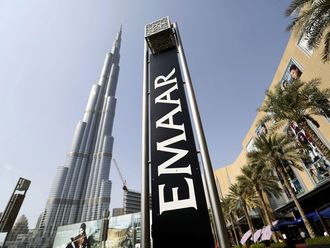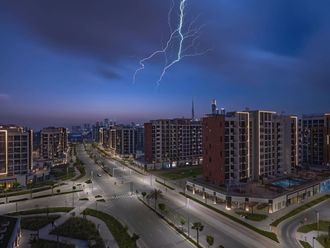About 15 months ago, Jones Lang LaSalle published a report that worryingly noted that 33 per cent of Dubai's 43.6 million square feet of commercial space was vacant, with an additional 40 million square feet (revised down from 60 million square feet) coming on to the market by 2012.
They've published a new report recently, which notes that current office supply (end of the first-quarter 2011) reached 60 million square feet of which 44 per cent was vacant. LaSalle estimates average city-wide rentals at Dh105 per square foot and average sale prices at Dh1,040 per square foot — down 64 per cent from the peak. Office supply will increase to 70, 81 and 85 million square feet by end of 2011, 2012 and 2013 respectively.
As many have already noted, that this is good news because it makes Dubai competitive again.
The rationale is that Dubai's exponential growth was pricing it out of many would-be tenants and that this price correction along with its world-class infrastructure will make it attractive to a broader base of businesses.
Talk to any government official and the two buzzwords that describe the way forward for Dubai are trade and tourism. Logistics and re-export will continue to be a core part of its value proposition and at 82 per cent 2011 YTD occupancy rates — partly on the back of regional turmoil — tourism seems to be recovering.
But Dubai continues to miss the opportunities that a real commitment to entrepreneurship could provide. In a February 2010 piece titled ‘Dubai's own stimulus plan' I argued that Dubai had limited options by which it could fill its current and upcoming pipeline of office space and suggested that it should consider sectioning off non-prime real estate for entrepreneurs. The proposition would be to allow them to occupy those spaces (in shell and core state) for a specified period of time, for example, three years and pay an all-in nominal (three digit) fee to the government in return for legal incorporation.
Five-fold benefits
The benefits would be five-fold: First, since only bootstrapping start ups would be approved, the government would've found a way to put some real estate out of the general market supply.
Second, with such a low cost of failure, these businesses could actually have a shot at success. Third, with start-ups coming up, more investors would recognise the value of venture capital and early stage investing. Fourth, this would increase employment, which would boost the city's collective purchasing power and real estate demand.
Finally, the creativity and cultural production that usually accompanies entrepreneurial activity would improve the general quality of life.
So why isn't this happening? I suspect it may have something to do with the meteoric boom Dubai underwent. While Dubai's shown its capacity to build businesses like Emirates, Dubai Ports World and Jumeirah, it has, for the most part played the role of landlord locally — and that of a hedge fund internationally.
Property rentals, sales
During that period, the majority of Dubai's revenues came in the form of either fees or property rentals and sales. Let me be clear: I do not think that being able to charge fees and real estate returns is a bad thing, far from it.
However, I do believe that being a landlord does make you biased against being an entrepreneur, or a believer in one. After all, landlords charge rent, usually upfront.
The risks are low but so are the returns. In other words, there are no surprises unless you incorrectly estimate your market's demand and over supply it. As they are famously described, entrepreneurs and those who back them underestimate risk and overestimate return.
But where would we be had Steve Jobs not underestimated the risk of making computers and overestimated the returns of selling them? Where would we be had people not attempted to be successful and failed so miserably only to inspire those who would come after them to carry on?
What else could you put your money and support behind that would create growth, innovation, optimism, and — in the most basic sense — a better life? This isn't just the story of Dubai; this is the story of the human capacity to evolve beyond what may seem as its predetermined course.
Dubai remains a great city that balances a tolerant lifestyle with quality human capital and physical infrastructure. There's no reason why this shouldn't happen here.
Mishaal Al Gergawi is an Emirati current affairs commentator.
Mishaal
Al gergawi












